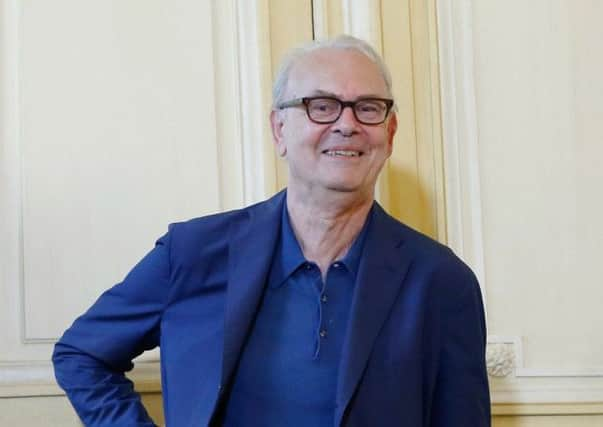Book review: Suspended Sentences by Patrick Modiano


Suspended Sentences
Patrick Modiano
Yale University Press, 216pp, £12.99
When it was announced that Patrick Modiano had won the Nobel Prize for Literature this year, I have to confess my first reaction was “Who?” I had read the previous French winner – J M G Le Clézio, but I’d never even heard of Modiano. Paint me blushed. The French, by the way, are the champions of the Nobel, with fifteen winners. I think that tells us more about the Nobel Academy and the parlous state of British translation than the esteem of French Literature.
Modiano’s citation compares him to Proust (wrongly, and it will no doubt annoy Karl Ove Knausgaard who seems to have cornered the marked in faux Proustian comparisons) and states he was awarded the top gong in books for “the art of memory with which he has evoked the most ungraspable human destinies and uncovered the life-world of the Occupation”.
CONNECT WITH THE SCOTSMAN
Advertisement
Hide Ad• Subscribe to our daily newsletter (requires registration) and get the latest news, sport and business headlines delivered to your inbox every morning
So my first encounter with Modiano’s work was this triptych of novellas – Afterimage, Suspended Sentences and Flowers of Ruin. They are not discrete works. The same characters, situations, even lines reverberate across these oddly similar stories. The first involves a young man, writing a novel, who becomes obsessed with a photographer he once met and who subsequently disappeared. The second is about a young man, writing a novel, who interrogates his strange abandoned childhood, left with the members of the Rue Lauriston Gang; then a third where a young man writing a novel investigates a double suicide which might have links to the Rue Lauriston gang. There are internments by Nazis in all three novellas, with strangely collusive escapes, and moments where the narrator would rather forget than remember, outnumbered by moments where the narrator remembers a striking moment, but has forgotten its significance. Each story has a quest to uncover the past – the whereabouts of the enigmatic photographer Jansen, the places a naive child was introduced to by vaguely criminal wards in the second and “the fate of a man wanted for colluding with the enemy, who might or might not have survived the Dachau concentration camp” in the third.
There is a sfumato quality to Modiano’s prose: even at its most specific and detailed, there is a sense of smudge and smear and smirr. “At times, it seems, our memories act much like Polaroids” the narrator confesses on the first pages of the first novella: an immediate, dazzling snapshot, which decays and degrades over time. The narrators are listless, despite making very specific lists – garages in the sixteenth arrondissement, photographs of strangers, a string of people the police would care to speak to in 1946. In all three novellas, the quest to understand the past by revisiting it in the present is frustrated – phone numbers no longer connect, buildings have been destroyed, chance encounters with minor characters from the past are ambiguous and ambivalent.
The Occupation and its netherworld of criminality, collusion and cowardice suffuses these novellas like an angry mist, a kind of literary flinch. It bequeaths to the narrators a hangover of shameful ennui: something terrible has been done, which they neither wholly understand nor wholly condemn; a grey area suited to the novels’ strange mistiness. They evoke a Paris gone, and despite all attempts by all concerned, not forgotten. There is a surrealist quality in Modiano’s work that recalls Louis Aragon first and foremost. “The smells of wine and coal now mix with the scent of leaves from the botanical gardens, and I hear the cry of a peacock and the roar of a jaguar and a tiger from the zoo. The plane trees and the silence of the Halles aux Vin. I am enveloped by a cellar-like chill. Somewhere someone is rolling a barrel, and that doleful sound slowly fades into the distance. It seems that in place of the old wine market they’ve now erected tall concrete buildings, but wide as I might open my eyes in the dark, I can’t see them”. Paris is feral and chic, alien and all-too-familiar in these haunting stories.
SCOTSMAN TABLET AND IPHONE APPS
Advertisement
Hide AdAs a first encounter with Modiano’s oeuvre, this at least makes me want to read more of his work. I have a snagging suspicion that this is not the book or books which earned him the accolade in Stockholm. There is more than a passing similarity to the work of Roberto Bolano, in that both writers suggest nefarious activity and then coyly make their innocent narrators disavow such behaviour; similarly, both have a suspicion of those who write rather than do.
There is a terrible lovelessness in these novellas. The second story might feature a pre-pubescent crush, and the narrator of the third has a daughter, but the overwhelming feeling is of lovelorn men, who channel their capacity for love into the past. “He was seeking a lost innocence and settings made for enjoyment and ease, but where one could never be happy again”.
Advertisement
Hide AdShould Modiano have won the Nobel against Gunter Grass, Thomas Pynchon, Marilynne Robinson, or A S Byatt? That is a question for the Stockholm unelected decideders to decide. I am glad to have read Modiano now, and will read his past and future books, but it seems as if his small canvas and personal obsessions – bad Dads, absent Mums, lost brothers – make his work strangely thin and occasionally pompous. Haunting though this work is, it seems like perfect fretwork rather than courageous ambition. He is a shifty writer, whose failure to look you in the eye, is profoundly unsettling.